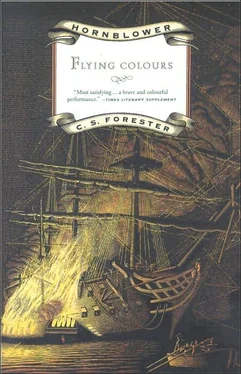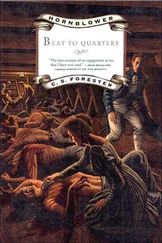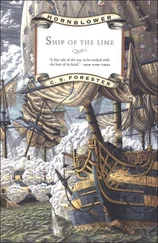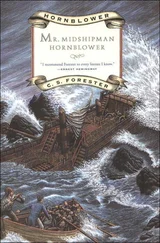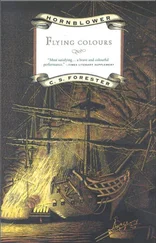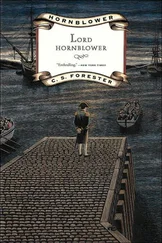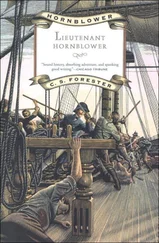Cecil Forester - Flying Colours
Здесь есть возможность читать онлайн «Cecil Forester - Flying Colours» весь текст электронной книги совершенно бесплатно (целиком полную версию без сокращений). В некоторых случаях можно слушать аудио, скачать через торрент в формате fb2 и присутствует краткое содержание. Год выпуска: 1989, ISBN: 1989, Издательство: Back Bay Books, Жанр: Исторические приключения, Путешествия и география, Морские приключения, на английском языке. Описание произведения, (предисловие) а так же отзывы посетителей доступны на портале библиотеки ЛибКат.
- Название:Flying Colours
- Автор:
- Издательство:Back Bay Books
- Жанр:
- Год:1989
- ISBN:0316289396
- Рейтинг книги:5 / 5. Голосов: 1
-
Избранное:Добавить в избранное
- Отзывы:
-
Ваша оценка:
- 100
- 1
- 2
- 3
- 4
- 5
Flying Colours: краткое содержание, описание и аннотация
Предлагаем к чтению аннотацию, описание, краткое содержание или предисловие (зависит от того, что написал сам автор книги «Flying Colours»). Если вы не нашли необходимую информацию о книге — напишите в комментариях, мы постараемся отыскать её.
Flying Colours — читать онлайн бесплатно полную книгу (весь текст) целиком
Ниже представлен текст книги, разбитый по страницам. Система сохранения места последней прочитанной страницы, позволяет с удобством читать онлайн бесплатно книгу «Flying Colours», без необходимости каждый раз заново искать на чём Вы остановились. Поставьте закладку, и сможете в любой момент перейти на страницу, на которой закончили чтение.
Интервал:
Закладка:
Hornblower laughed again, horribly.
“They will serve to keep you awake, then,” he said.
His instinct had dictated the reply; his reason confirmed it. It would be best to show no hint of weakness towards this man who had it in his power to wreck everything—the more firmly the pilot was convinced of his captor’s utter pitilessness the less chance there was of his playing them false. Better that he should endure the pain of tight ligatures than that three men should risk imprisonment and death. And suddenly Hornblower remembered the four other men—the sergeant and the mate and the two hands—who lay gagged and bound in the cabin. They must be highly uncomfortable, and probably fairly near to suffocation. It could not be helped. No one could be spared for a moment from the deck to go below and attend them. There they must lie until there was no hope of rescue for them.
He found himself feeling sorry for them, and put the feeling aside. Naval history teemed with stories of recaptured prizes, in which the prisoners had succeeded in overpowering weak prize crews. He was going to run no risk of that. It was interesting to note how his mouth set itself hard at the thought without his own volition; and it was equally interesting to observe how his reluctance to go home and face the music reacted contrariwise upon his resolution to see this affair through. He did not want to fail, and the thought that he might be glad of failure because of the postponement of the settlement of his affairs only made him more set in his determination not to fail.
“I will loosen the cords,” he said to the pilot, “when we are off Noirmoutier. Not before.”
Chapter Fourteen
They were off Noirmoutier at dawn, with the last dying puff of wind. The grey light found them becalmed and enwreathed in a light haze which drifted in patches over the calm surface of the sea, awaiting the rising of the sun to dissipate it. Hornblower looked round him as the details became more clear. The galley slaves were all asleep on the foredeck, huddled together for warmth like pigs in a sty, with Brown squatting on the hatch beside them, his chin on his hand. Bush still stood at the tiller, betraying no fatigue after his sleepless night; he held the tiller against his hip with his wooden leg braced against a ring bolt. Against the rail the pilot drooped in his bonds; his face which yesterday had been plump and pink was this morning drawn and grey with pain and fatigue.
With a little shudder of disgust Hornblower cut him loose.
“I keep my promise, you see,” he said, but the pilot only dropped to the deck, his face distorted with pain, and a minute later he was groaning with the agony of returning circulation.
The big mainsail boom came inboard with a clatter as the sail flapped.
“I can’t hold the course, sir,” said Bush.
“Very well,” said Hornblower.
He might have expected this. The gentle night wind which had wafted them down the estuary was just the sort to die away with the dawn, leaving them becalmed. But had it held for another half hour, had they made another couple of miles of progress, they would be far safer. There lay Noirmoutier to port, and the mainland astern; through the shredding mist he could make out the gaunt outlines of the semaphore station on the mainland—sixteen years ago he had been second in command of the landing party which Pellew had sent ashore to destroy it. The islands were all heavily garrisoned now, with big guns mounted, as a consequence of the incessant English raids. He scanned the distance which separated them from Noirmoutier, measuring it with his eye—they were out of big gun range, he fancied, but the tide might easily drift them in closer. He even suspected, from what he remembered of the set of the tides, that there was danger of their being drifted into the Bay of Bourgneuf.
“Brown,” he called, sharply. “Wake those men up. Set them to work with the sweeps.”
On either side of every gun was a thole for a sweep, six on each side of the ship; Brown shoved his blear-eyed crew into their positions and showed them how to get out the big oars, with the long rope joining the looms.
“One, two, three, pull!” shouted Brown.
The men put their weight on the oars; the blades bubbled ineffectively through the still water.
“One, two, three, pull! One, two, three, pull!”
Brown was all animation, gesticulating, running from man to man beating time with his whole body. Gradually the cutter gathered way, and as she began to move the oar blades began to bite upon the water with more effect.
“One, two, three, pull!”
It did not matter that Brown was counting time in English, for there was no mistaking his meaning, nor the meaning of the convulsive movements of his big body.
“Pull!”
The galley slaves sought for foothold on the deck as they tugged; Brown’s enthusiasm was infectious, so that one or two of them even raised their voices in a cracked cheer as they leaned back. Now the cutter was perceptibly moving; Bush swung the tiller over, felt the rudder bite, and steadied her on her course again. She rose and fell over the tiny swell with a clattering of blocks.
Hornblower looked away from the straining men over the oily sea. If he had been lucky he might have found one of the ships of the blockading squadron close inshore—often they would come right in among the islands to beard Bonaparte. But to-day there was no sail in sight. He studied the grim outlines of the island for signs of life. Even as he looked the gallows-like arms of the semaphore station on the mainland sprang up to attention. They made no further movement, and Hornblower guessed that they were merely announcing the operators’ readiness to receive a message from the station further inshore invisible to him—he could guess the purport of the message. Then the arms started signalling, moving jerkily against the blue sky, transmitting a brief reply to the interior. Another period of quiescence, and then Hornblower saw the signal arms swing round towards him—previously they had been nearly in profile. Automatically he turned towards Noirmoutier, and he saw the tiny speck of the flag at the masthead there dip in acknowledgement. Noirmoutier was ready to receive orders from the land. Round and round spun the arms of the semaphore; up and down went the flag in acknowledgement of each sentence.
Near the foot of the mast appeared a long jet of white smoke, rounding off instantly into a ball, and one after the other four fountains of water leaped from the glassy surface of the sea as a shot skipped over it, the dull report following after. The nearest fountain was a full half mile away, so that they were comfortably out of range.
“Make those men pull!” roared Hornblower to Brown.
He could guess what would be the next move. Under her sweeps the cutter was making less than a mile in the hour, and all day long they would be in danger, unless a breeze came, and his straining eye could see no hint of a breeze on the calm surface of the sea, nor in the vivid blue of the morning sky. At any moment boats crowded with men would be putting off towards them—boats whose oars would move them far faster than the cutter’s sweeps. There would be fifty men in each, perhaps a gun mounted in the bows as well. Three men with the doubtful aid of a dozen galley slaves could not hope to oppose them.
“Yes I can, by God,” said Hornblower to himself.
As he sprang into action he could see the boats heading out from the tip of the island, tiny dots upon the surface of the sea. The garrison must have turned out and bundled into the boats immediately on receiving the order from the land.
“Pull!” shouted Brown.
The sweeps groaned on the tholes, and the cutter lurched under the impulse.
Читать дальшеИнтервал:
Закладка:
Похожие книги на «Flying Colours»
Представляем Вашему вниманию похожие книги на «Flying Colours» списком для выбора. Мы отобрали схожую по названию и смыслу литературу в надежде предоставить читателям больше вариантов отыскать новые, интересные, ещё непрочитанные произведения.
Обсуждение, отзывы о книге «Flying Colours» и просто собственные мнения читателей. Оставьте ваши комментарии, напишите, что Вы думаете о произведении, его смысле или главных героях. Укажите что конкретно понравилось, а что нет, и почему Вы так считаете.
